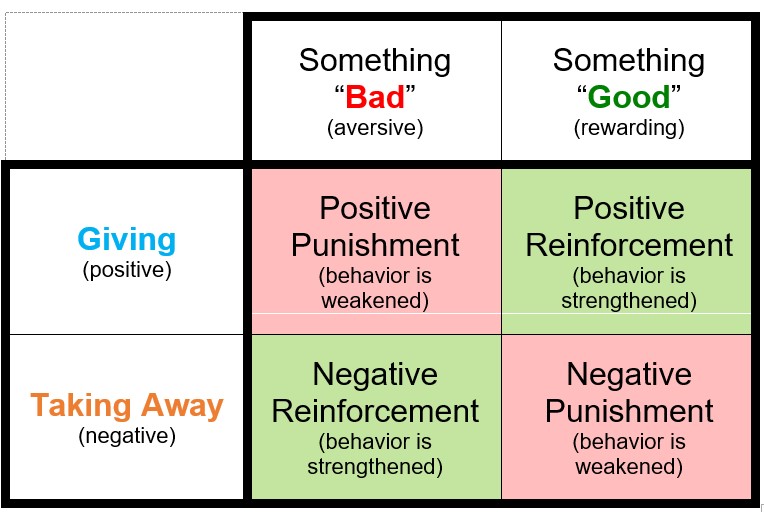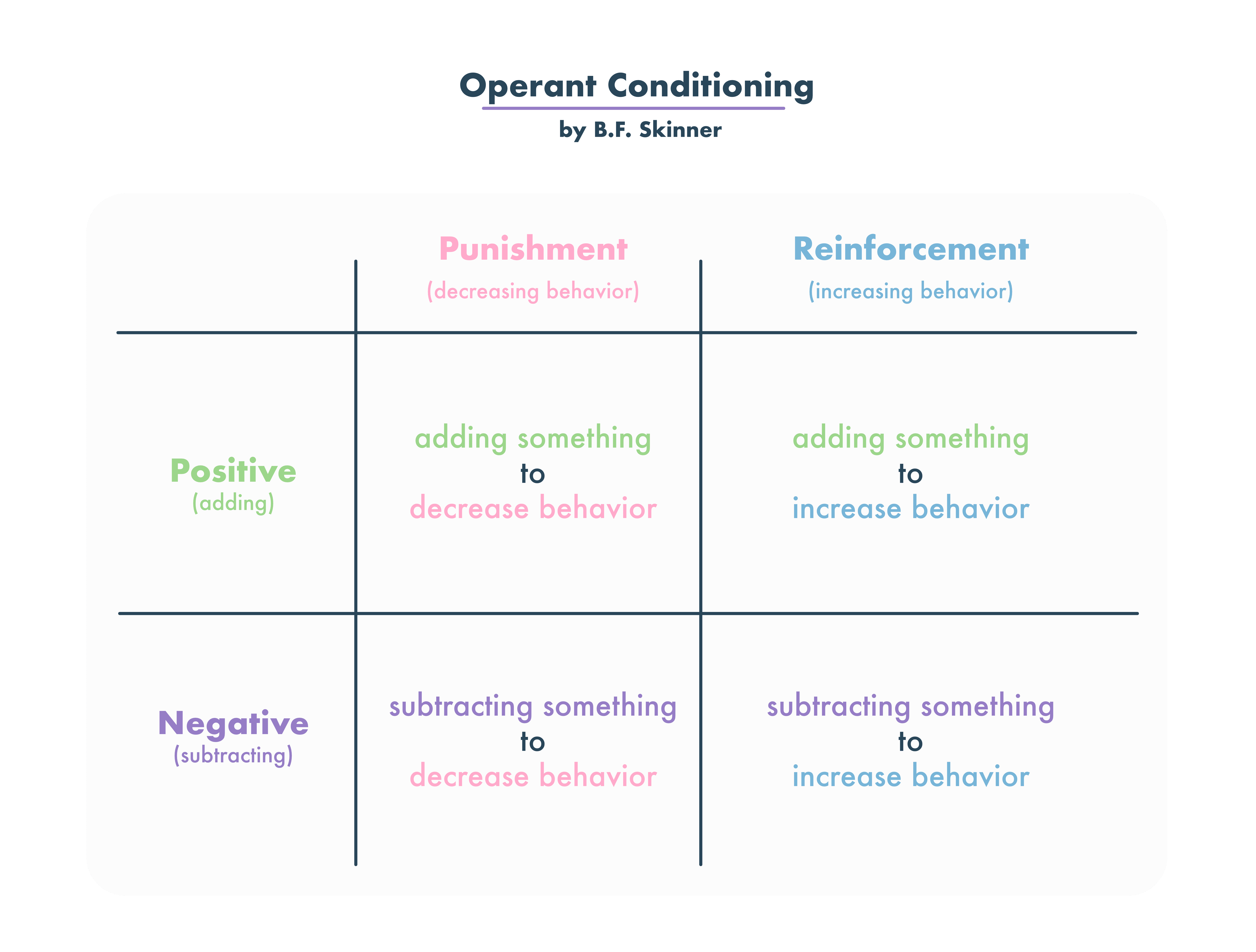In simple terms the presence of a reinforcer a reward complimen. Skinner is a behaviorist approach towards learning.

Module 6 Basic Operant Conditioning Principles Procedures And Respondent Conditioning And Observational Learning Principles Of Behavior Analysis And Modification
This often causes them to believe and act in ways that are out of the norm either to avoid a negative outcome or to bring about a positive outcome.

. In operant conditioning an organism associates its own behaviors with their consequences. Operant conditioning is a theory of behaviorism that focuses on changes in an individuals observable behaviors. Burrhus Frederic Skinner is regarded as the father of operant conditioning.
Also you shouldnt reinforce the previous. Operant conditioning is a process that tries to modify behavior using positive and negative reinforcement and punishment. Next step reinforce the behavior that is closer to the target behavior.
By rewarding responses that are ever closer to the final desired behavior successive approximations and ignoring all other responses researchers can gradually shape complex behaviors. Through this process an association is formed between the behavior and the consequences of that behavior. Many people believe that superstitions are absolutely true.
Rewarded behavior is likely to recur. February 4 2021 in Uncategorized by Joseph. It is the form of conditioning which explains the relationship between behavior and their consequences or rewards Reinforcements and Punishments.
In this a person is conditioned to acquire a certain behavior in the presence of a reinforcer. Process of operant conditioning Describe the process of operant conditioning including the shaping procedure. He named these behaviors or responses as operant.
Operant conditioning or instrumental conditioning focuses on using either reinforcement or punishment to increase or decrease a behavior. Skinners work elaborated a simple fact of life that Edward Thorndike called the law of effect. However the origins of all superstitions lie in operant conditioning.
Operant conditioning given by BF. Operand Conditioning and Superstitions Essay Assignment Paper Describe a specific aspect of the operant conditioning process that leads to these beliefs becoming so deeply ingrained and long standing in nature. Explain any two of these processes.
Describe a specific aspect of the operant conditioning process that leads to these beliefs becoming so deeply ingrained and long standing in nature. Operant conditioning is a form of learning in which the motivation for a behavior happens after the behavior is demonstrated. These two forms of learning differ in an important way.
Operant conditioning is based on the work of B. Operant Conditioning And Superstitions. Operant conditioning involves operant behavior that actively operates on the environment to produce stimuli.
An animal or a human receives a consequence after performing a specific behavior. It comprises the application of rewards or penalties when behavior is shown its goal is to encourage the regulated behavior. The consequence is either a reinforcer or a punisher.
Keep reinforcing the responsesbehaviors. LASA 1Operant Conditioning and Superstitions Many people believe that superstitions are absolutely true. He is also called the father of Operant Conditioning Learning but he based his theory known as Law of Effect discovered by Edward Thorndike in 1905.
Skinner an American psychologist was the first to describe it. Then describe in detail the thinking processes involved that resulted in the acquisition and perpetuation of this irrational belief. This often causes them to believe and act in ways that are out of the norm either to avoid a negative outcome or to bring about a positive outcome.
In classical conditioning an organism associates different stimuli that it does not control and responds automatically. Explain whether a person can ever be rid of superstitions. How did you learn them.
What kinds of things have you learned through the process of classical conditioning. In operant conditioning new or continued behaviors are impacted by new or continued consequences. In your answer be sure to describe what you have learned explain why you believe it reflects the type of learning and describe the process of learning.
Then describe in detail the thinking processes involved that resulted in the acquisition and perpetuation of this irrational belief. Voluntary behaviours are actions that can be controlled by the organism such as running writing an essay or skydiving. In operant conditioning an association is made between behaviour and the consequence for the behaviour.
Operant conditioning is a type of learning in which a new voluntary behaviour is associated with a consequence - reinforcement makes the behaviour more likely to occur while punishment makes it less likely to occur. Operant conditioning is a type of associative learning which focuses on consequences that follow a response or behavior that we make and whether the consequences make a behavior more or less likely to occur. Steps involved in the process of Shaping For starters reinforce any behavior that is even remotely close to the desired target behavior.
Describe the process of operant conditioning including the procedure of shaping as demonstrated by Skinners experiments. Skinner proposed his theory on operant conditioning by conducting various experiments on animals. Then describe in detail the thinking processes involved that resulted in the acquisition and perpetuation of this irrational beliefDescribe a specific aspect of the operant conditioning process that leads to these beliefs becoming so deeply ingrained and long standing in natureExplain whether a person can ever be rid of superstitions.
According to him The behavior of an individual is influenced by the consequences. Skinner has defined Learning behavior through a called an operant conditioning theory.
Diagram Of Operant Conditioning Download Scientific Diagram
:max_bytes(150000):strip_icc()/2794863-operant-conditioning-a21-5b242abe8e1b6e0036fafff6.png)
What Is Operant Conditioning And How Does It Work Quora

Operant Conditioning Examples And Research Practical Psychology
0 Comments